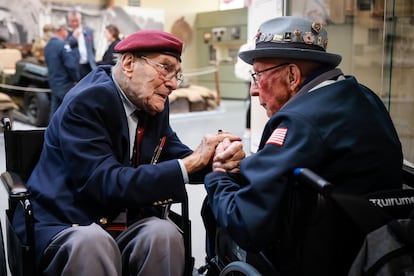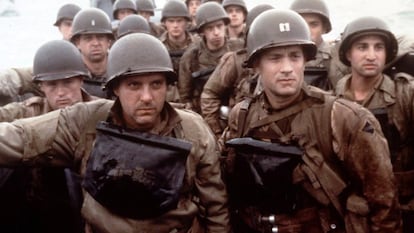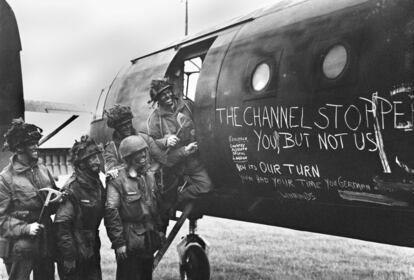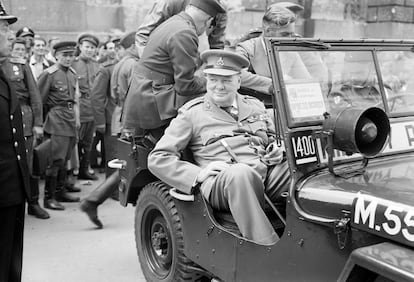The shadow of the cigar and the profile of bulldog about him longest day: the book Churchill’s D-Day by retired British general Lord Richard Dannatt and his compatriot the expert archivist Allen Packwood (Criticism, 2024), analyzes the Allied landing in Normandy, which marks 80 years on Thursday, through the role he played in that key moment of the Second World War. World War the then Prime Minister of the United Kingdom. In a fascinating story (which does not lack the pain of the civilian population and great individual adventures) and full of very interesting information extracted from the personal archives of Winston Churchill, the book traces the before, during and after the invasion of France. He does so with special attention to the doubts and decisions of the British leader, who had been held responsible for the failure of the amphibious campaign in the Dardanelles and the disastrous landings in Gallipoli in the First World War (and after the disaster at Narvik, beginning of the second contest). Churchill’s great nightmare was that the invasion troops would be trapped on the beaches and decimated. “Do you realize that when you wake up in the morning, 20,000 men may have died?” he said anguished to his wife Clementine on the eve of D-Day (3,800 of the soldiers who landed on June 6 ultimately died). , a list of casualties much lower than expected).
Asked in an interview with this newspaper about what they think of the iconic Saving Private Ryan and its impact on the popular imagination about what the longest day, Both authors believe that the opening sequence of the film describes in a “very vivid and precise” way the horrors of the American landing on Omaha Beach. But they clarify that the film is “a bit fantastic” and ignores the British effort. “Pretend that Tom Hanks and his band of brothers It’s the whole vision of D-Day is very restrictive. It was not so”. In reality, the British troops landed at Gold relieved pressure on Omaha, they point out, and prevented a German counterattack on that beach that would have driven the Americans back to sea. They also remember that their landing in Utah was easier (the casualty figures in Omaha were ten times those of the other beach entrusted to the United States). Above all, they emphasize, “without Churchill having managed to postpone it until the right conditions were met in 1944, the landing would not have been successful.” Dannatt emphasizes: “Churchill really liked cinema, and he would have enjoyed Spielberg’s film, but he would have liked to see more British troops in the film.”
Dannatt and Packwood vindicate the Churchill of 1944, whose role, they point out, is much less known and valued than the one he played in 1940, the “most glorious hour” of “blood, sweat and tears” and “we will never give up.” Finally, of course, the British fought on the beaches, but in a different way than they imagined then. To the fairly widespread opinion that Churchill was reluctant to open a second front in France and hesitated with the invasion, the authors oppose their opinion that the prime minister acted with the necessary caution before supporting an operation that, without adequate preparation, could have course a catastrophic setback. In any case, they highlight, Churchill’s contribution “was fundamental to the temporal programming and nature of Operation Overlord.”
Dannatt and Packwood trace the first seeds of D-Day already in the evacuation of Dunkirk (due to its excellent planning) and follow the long road full of obstacles towards the invasion that would include the difficult negotiation with allies Roosevelt, Stalin and De Gaulle, trials ( the Dieppe disaster in August 1942, the little-known Tiger drill in April 1944, when German torpedo boats caused enormous casualties to a test force), a detour that would lead to earlier landings in North Africa and Italy, elaborate deceptions to the Germans and colossal planning. Among the essential requirements to launch the invasion and of which Churchill was very aware, the authors detail, were controlling the sea and winning the battle of the Atlantic – especially averting the threat of German submarines -, dominating the air, accumulating enough men and material (such as landing ships), and provide experience and morale to the troops.
Richard Dannatt and Allen Packwood explain that they both feel a special involvement this anniversary. The first because he has been a colonel of the Green Howards, the same regiment to which Sergeant Major Stan Hollis belonged, one of the protagonists of the book and the only winner of a Victoria Cross on D-Day – charging twice against German positions -, and for his involvement with the creation of the Winston Churchill Educational Center on Gold Beach, where Hollis fought and where the British Normandy Memorial is located. The Churchill Center, he explains, will be inaugurated by King Charles III on Thursday and its purpose is to make future generations understand what D-Day was “and the role of the British in restoring freedom in Europe.” As for Packwood, whose work on the book culminates a long experience of 30 years working with Churchill’s personal documents, he remembers that the 80th anniversary of D-Day coincides this year with the 150th anniversary of Churchill’s birth (1874-1965). “So it is very pertinent to focus on the role of the prime minister in the decisions regarding the disembarkation,” he points out.

The authors of Churchill’s D-Day They emphasize that obligations towards the varied interests of the British Empire—a larger-scale view of priorities—added to prudence for Churchill to delay the landing until 1944 despite the insistence of his allies. “Churchill had an overview of the different theaters and knew that the invasion had to be carried out at the right time and that 1942 and 1943 were too soon,” says Dannatt, who is difficult to see in civilian clothes after looking at photos of him in uniform. . “Today, knowing what happened, it is easy to underestimate the level of uncertainty and risk that the invasion of France presented. It was not at all clear that it would turn out well, and if it had failed the price would have been very high, including the political end of Churchill, and also serious problems for Roosevelt. The retired general emphasizes that failure was a very real possibility, even in June 1944. One uncontrollable factor was the weather, which only offered a window of opportunity on June 6 (well used). But there could also have been a security breach that revealed the entire operation to the Germans, something that obsessed the British (just ask The Needle, Ken Follet’s Nazi spy). Or Hitler could not have tied up his Panzer divisions. “There were so many ways things could go wrong.” The result would have been, apart from the human and material cost (and the boost in German morale), not being able to launch a similar operation again until perhaps three years later. Eisenhower himself left an eloquent letter assuming responsibility for the failure considering that everything could go very, very wrong.
Packwood points out that the richness of Churchill’s archives allows us to see the complexity of the story. He stresses that it was impossible for Churchill to carry out the operation before 1944, nor to take it lightly. “He certainly had the unmitigated disaster of Gallipoli on his mind and felt the pressure of previous failures, which fueled a fear in him,” adds Dannatt. At the same time, he was aware of the tremendous effort that the USSR was making and of the not only military but moral need to open the second front. There was also a practical consideration: letting the Soviets win the war had enormous political implications.

Would the Allies have won the war without the landing? “Yes,” the two authors agree, although it would have required more time, and would have left the USSR in a stronger position. “Churchill and Roosevelt knew that they not only had to defeat the Germans but also put a stop to possible Soviet expansion in Europe and this required the invasion of France, something that the prime minister had also promised,” says Dannatt, Churchill was very sensitive to Stalin’s doubts about the courage of the British. There is another element, he adds: “The delay in ending the war meant that Hitler could continue with the Holocaust, the extermination of the Jews, which the Allies knew about. “It was imperative to shorten the deadlines until reaching the unconditional surrender of Nazi Germany.”
Churchill was not only worried about military casualties, he was also obsessed with the civilian deaths from Allied bombing and that the French population could turn against the invaders.
Regarding the importance of the soldier’s morale and courage in relation to what it was like to land on the Norman beaches on D-Day, Dannatt, who has commanded troops in combat, points out that personal courage and the will to do one’s duty They are essential and they were that long day. He remembers in this regard that Napoleon said that, in comparison, the soldier’s morale is worth 3 and physical strength is worth 1. “But without a good operational plan, weapons and resources, bravery is not enough,” he says.

In their book, the authors, who remember that the landing was only the beginning of a few key days and weeks in which there were moments of great uncertainty and enormous battles, pay attention not only to the infantrymen, glider pilots and paratroopers in the invasion , but to the role of women on D-Day. They were key in many areas, they say. There is the case of Christan Oldham, a wren (women’s service of the Royal Navy), recruited to analyze the maps of Normandy and who was aware of one of the best kept secrets of the war, the landing beaches. Or that of Joan Bright, employed in a clandestine unit of the British Secret Intelligence, in charge of planning acts of sabotage and later director of a special information center for commanders. Or war correspondents like Virginia Cowles. One of Churchill’s daughters, Sarah, worked in the RAF’s photographic interpretation unit and analyzed photos of the V-1 launch pads. Hitler continued to threaten like the eye of Sauron in the sky in that beginning of the end that would still cost a lot of blood, sweat and tears.
Subscribe to continue reading
Read without limits
_

